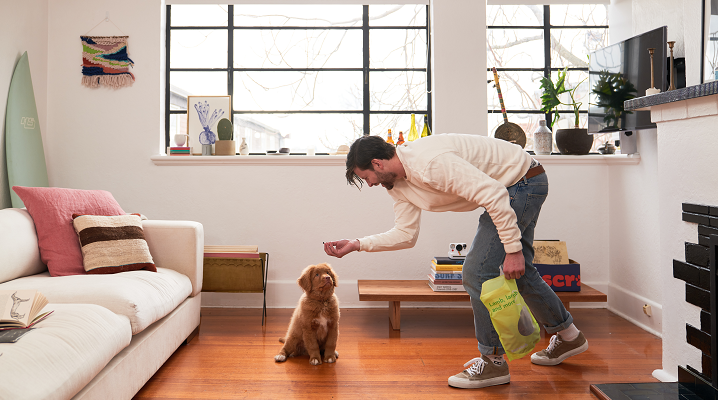Inside Retail: Tell me about Scratch – How did it start, and why pet/dog food? Mike Halligan: Because dogs are the best. But also because I started to understand how average most dry dog food is. There are over 5 million dogs in Australia and about 70 per cent of them have dry food in their diet. Over time, it’s causing all of these health problems. Dry dog food doesn’t have to be filled with so many carbohydrates, starches and questionable ‘meats’ – it’s just cheaper to do so. So
So I teamed up with Doug who’d been working in the industry for eight years, to make a more balanced and healthy option, and Scratch was born.
We sell our dog food online via subscription to over 30,000 dogs around Australia, spending about 40 per cent more on premium ingredients than similarly priced store brands. We’re Australia’s only B-Corp pet company and proudly lead in transparency so dog owners can know what’s in the food they’re feeding their best friends.
IR: How is Scratch putting dogs before profit and changing the pet food industry for the better?
MH: We’re really clear on not wanting to be the biggest dog food company. There are enough dogs and brands around to keep us busy and keep food on the table. Once you know that you’re not trying to go down the grow that-all-costs route, it’s easy to build impact. We start by donating two per cent of all revenue to climate action and dog welfare. That sustainable-growth mantra extends to so many decisions about how we treat customers, suppliers, and our team.
The biggest impact that we hope to make is in pushing the Australian pet food industry to step up transparency. It’s unregulated and full of misleading information for dog owners. A type of dog food could have 5 per cent lamb or 30 per cent lamb, 8 per cent potato starch or 37 per cent – and there’s no way of telling. But those kinds of things make a big difference to a dog’s health over time.
IR: How has the business grown over the years, and why is growth now off the agenda?
MH: We’re seeking sustainable growth, instead of growth at all costs. These days, we’re doing over $10 million in annualised revenue and have raised $750,000 in working capital over the life of the business, so we’re pretty proud and satisfied with our model. There’s no hockey stick at Scratch but as long as dogs love us and their humans appreciate what we’re doing, I’m sure the business will be fine.
IR: Are there particular brands and leaders, in and outside your field, that you look up to?
MH: Locally, I love Bellroy’s sustainable growth and considered decisionmaking, and Who Gives a Crap’s ability to make something as boring as toilet paper and sanitation engaging and fun. Globally, I couldn’t have more respect for Glossier, Tracksmith and Patagonia – for different reasons.
IR: What qualities do you think are needed to succeed in the pet food industry?
MH: Empathy, problem solving and patience. Dogs need to be fed like clockwork, but it’s not always easy getting food made on time when you have floods affecting Aussie produce or driver shortages preventing trucks moving around the country. Since Covid-19 hit, there’s always some sort of supply-chain problem to solve. We do a lot of work to hold back new customers from buying our food at the expense of existing customers when we see problems on the horizon, so there’s a lot of patience and long-term thinking at play. Lastly, empathy is a big one because we love our dogs more than ever so they’re big parts of our family.
IR: Is there any connection between coding and developing websites, and building relationships with pets and pet owners?
MH: When you’re selling online, those dots definitely connect. The more I understand my own dog’s needs, my needs as a dog owner and the variety of customers we have, the better my team gets at designing and coding up things in our website or UX that make our customers’ lives easier.
IR: Can you discuss the life lessons you’ve learned from working with dogs and, more specifically, your relationship with your puppy, Mello?
MH: Puppies are hard work. With kids, you assume that you’re going to be able to take on less, but with a puppy, you try to carry on with your life just as before. Mello is eight months old now and is teaching me patience, stepping back from full-productivity mode, and that walks are best done slowly and contemplatively.
This story first appeared in the February 2023 issue of Inside Retail Magazine.

